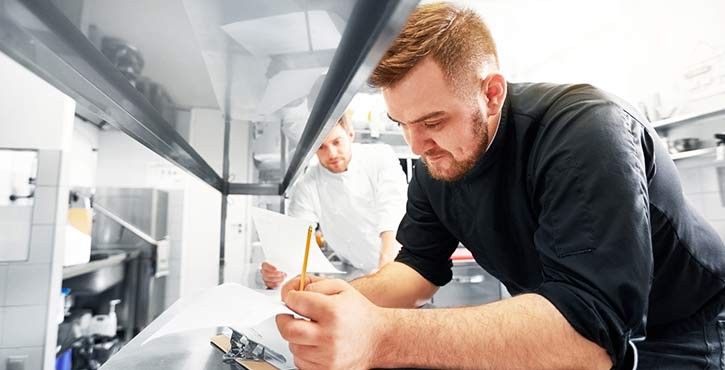From food scraps to broken crockery, restaurant waste is hard to avoid, and commercial kitchens have always been subject to high volumes of food waste, which is both wasteful and costly. Customers are also now more aware than ever of this! As a restaurant or commercial food business owner, you are responsible for reducing your waste as much as possible, from recycling to reusing, so there is as little environmental impact as possible.
Below we explain six easy-to-implement steps to help reduce your commercial kitchen waste, from creating a plan-of-action and managing produce, to how onboarding new intelligent cooking equipment can help reduce food waste!
Six Steps to Reducing Commercial Kitchen Food Waste:

1. Creating a Strategy.
Get your entire team together, share ideas and develop a waste-reduction strategy for your commercial kitchen. This means you can set goals and objectives that will have your team's investment as you have involved them in the planning process. A good strategy should include details on how to reduce food waste and other potential waste sources, such as disposables or packaging.
2. Monitor Produce Use.
Mismanaging inventory can lead to spoilage and wasted resources. Hence, keeping an accurate record of food products entering the kitchen and the amount used is essential. Additionally, ensuring that produce is rotated correctly (using the FIFO principle) and all ingredients are stored by their best-before date will help reduce food waste. Also, if you notice a less popular menu item leading to wasted food, you can either tweak the dish, offer it as a special, or remove it from your offering.
-fix725x370.jpg)
3. Manage Temperatures.
It's vital to regularly check storage temperatures to retain freshness and reduce waste. Temperature-controlled fridges and freezers are essential for keeping food products at their best and ensuring they don't spoil or go off, as doing so will not only create costs but also create unnecessary food waste.
4. Recycling.
Do your food deliveries come in cardboard boxes? Recycling is an integral part of waste management in commercial kitchens. From recycling delivery boxes and containers to reusing materials such as glass and plastic, there are many opportunities to reduce commercial kitchen waste that goes into landfills beyond reducing food waste.

5. Educate your team.
Once everyone knows about your plan to reduce waste in the kitchen it will be easier to put it into action. They will also be able to propose areas of improvement as they carry out your new waste reduction plans!
6. Invest to Reduce.
Investing in the right commercial kitchen equipment can help reduce food waste dramatically. The RATIONAL iCombi Pro is a revolutionary cooking system that offers intelligent cooking and helps eliminate cooking mistakes or mismanagement, which leads to food waste. The iCombi Pro uses advanced algorithms to precisely control temperature, humidity and core temperatures during the cooking process, ensuring that your food is cooked perfectly. Its integrated self-cleaning function allows for hygienic operation and reduced downtime, optimising production times while saving energy and resources. The RATIONAL iCombi Pro also offers an easy-to-use interface with direct access to recipes, reducing human errors and helping you maintain consistency across all dishes, which again can contribute to food waste!
Commercial kitchen waste is a real problem, but businesses can make a difference with the right strategies. Monitoring produce use, managing temperatures, recycling packaging and educating staff about your plan of action are all ways to reduce food waste in the commercial kitchen. Investing in the right equipment such as RATIONAL’s iCombi Pro is the way to go for an even greater impact. This piece of cutting-edge technology eliminates human error, saves time and energy - and reduces environmental impact! Plus, it helps you save money on overhead costs over time.
If you're looking for ways to optimise your commercial kitchen operations, get in touch with the experts at RATIONAL , who can start you on your journey to a kitchen that is more considerate of the environment